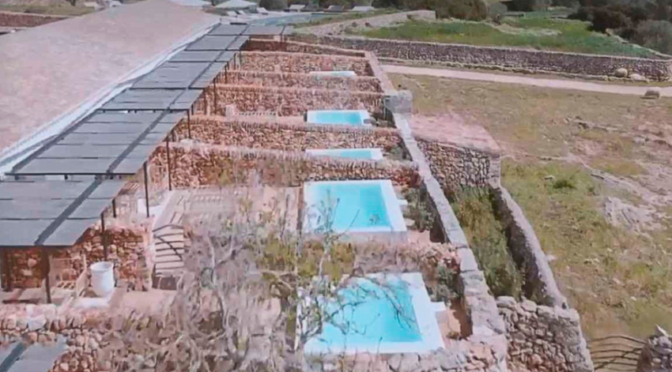Views: 1313
The case of the illegal swimming pools in the Torre Vella agro tourism is not yet closed. There are still a few episodes to be resolved found in a dossier that is subject to a glaring lack of transparency. The town council has returned to denying GOB access for consulting the relevant documentation.
At this site near Alaior, they have started some interesting agricultural production. There are olives, grapes, aromatic herbs and beehives. They want to do the product processing on site or jointly with Santa Ponça farm also owned by them.
The argument surrounding Torre Vella is not agricultural but urban and environmental. It is worth remembering that this agro tourism hotel started its processing when all the agricultural buildings would be dedicated to tourist activities and they could increase their volumes.
The principal buildings are the farmhouse and a large cowshed. Extensions were planned for both cases. Another eight auxiliary buildings (stables, warehouses, barns, etc) were also included destined for tourism and enlargement. In total, 5500 cubic metres for tourism. A swimming pool was included.
Then, not having left anything for agricultural use, they put up new buildings occupying some 1,000 square metres adjoining the Cami de Cavalls.
Despite the fact The Island Council (Consell Insular) declared the project was declared of general interest and it passed an environmental impact assessment, the developers found time to talk to the media to say that they were finding many obstacles for their project. The activities they had completed indicated they had influenced the development in a very serious way.
The problem is that they decided to breach the conditions of the authorization for the entire operation. So, in addition to GOB’s notice to the Urban Planning Discipline Department in the autumn of 2019, regarding the appearance of seven swimming pools that had not been declared in the project, now there was the discovery of another list of irregularities. The Department inspectors saw platforms, sheds and thousands of square metres of cemented and other pavements.
When these breaches became known, the Government Department of Environment sent their Agents to carry out another inspection. In addition to the things already mentioned, they found landfills (of more than 2,000 square metres) and the opening of a new road expressly denied, as well as the paving of other roads.
Altogether, this is a culmination of breaches of great magnitude. The solution is complicated if they insist in not returning to the project that was approved. In this case, it is not enough just to comply with urban rules, but they must also comply with the environmental conditions that were applied yet have been completely ignored.
In other words, if the swimming pool had been for rainwater and wastewater containers, that were to save consumption from the well, they could not now be swimming pools. They cannot be legalized as such. If the opening of a road is denied, it cannot now be left open. If areas cannot be paved – in order to decrease rustic land – they cannot now remain paved. And so on.
This case is one to which a curious lack of transparency is added. When GOB learned some years ago that the developers had presented documents for legalize irregularities, the Alaior Town Council denied GOB access to the files. Despite the fact that it was a case in which GOB had appeared personally on repeated occasions and that they have obvious environmental relations, the Town Hall denied access alleging that the case did not have a final result.
Last November, the Town Hall was asked again, but gave the same negative reply.
Meanwhile the illegal swimming pools are working and promoted as though they have been legal for the last three to four years.
The obscurity of these cases has been denounced by GOB in front of the Council for Transparency. If there is no positive response, it has been agreed that administrative litigations will be applied.
For more information on this case, you can visit Santa Ponça and the indignant promoters, Seven illegal swimming pools in an agro tourism.

